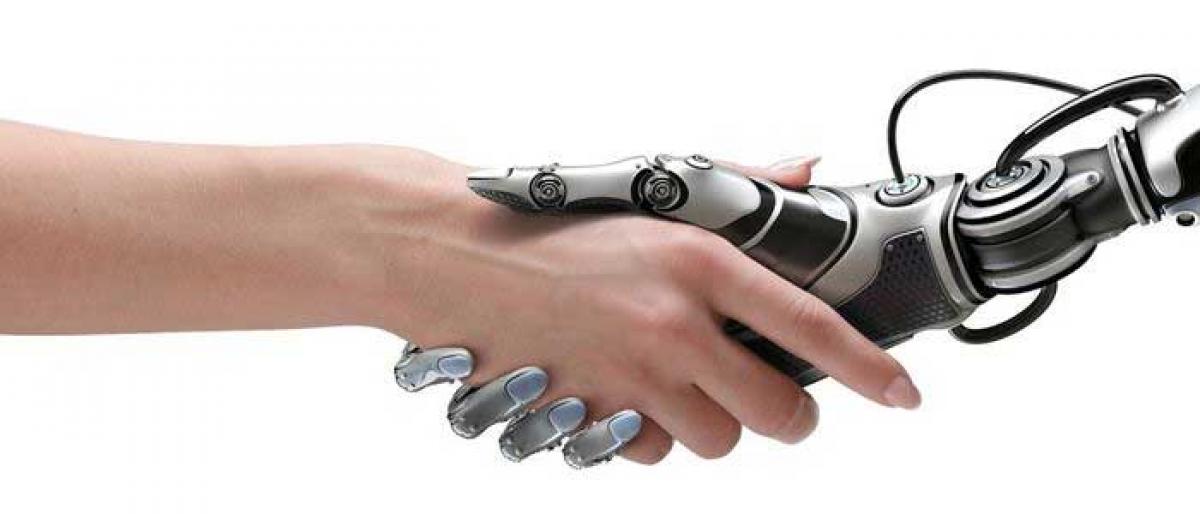A new future for jobs

A task force has been established to advise the government how to integrate Artificial Intelligence (AI) into the Indian economy. Cars, refrigerators and mobile phones have all become \'smart\'. A deeper change is on the anvil. The development of AI will lead to the computers taking away large chunks of repetitive mental works such as driving cars and undertaking legal research.
A task force has been established to advise the government how to integrate Artificial Intelligence (AI) into the Indian economy. Cars, refrigerators and mobile phones have all become 'smart'. A deeper change is on the anvil. The development of AI will lead to the computers taking away large chunks of repetitive mental works such as driving cars and undertaking legal research.
The task force intends to focus on the impact of AI on established economic activities such as manufacturing, healthcare, agriculture and food processing, education and retail. Chair of the Task Force Professor Kamakoti of IIT Madras said that the focus will be on how AI will impact the people. This perspective is in the right direction because AI is expected to take over large number of jobs.
Our condition is more precarious given we are adding about one million workers to our workforce every month. Our parents produced large number of children towards the end of the last century. These young workers will turn into a “demographic catastrophe” if they cannot be provided jobs. The challenge before us is not only to provide jobs for those who are displaced by AI, but also to provide for the large numbers of new workers entering the workforce.
A glimpse of the changes likely to hit society can be obtained by a similar change that took place nearly 500 years ago. An inventor of a knitting machine went to Queen Elizabeth I of England seeking patent for his invention. The Queen denied the patent saying, “I have too much regard for the poor women and unprotected young maidens who obtain their daily bread by knitting to forward an invention which, by depriving them of employment, would reduce them to starvation.”
But textile mills adopted the machine anyways. That did not lead to fewer jobs for the weavers, however. On the contrary, the machine ended up creating more jobs for them. The machine brought down the price of knitwear, led to increased consumption and by the end of the 19th century, there were four times as many workers in the weaving factories as there had been a century earlier.
Similarly, machine driven looms took over the task of weaving cloth in the nineteenth century. But the number of textile workers grew because demand increased. Two centuries ago a person would often own one set of clothes. The availability of affordable cloth has led to most of us owning half a dozen sets. That has led to increased consumption of cloth and to more jobs. Difference was that new jobs were created for mechanics and fitters, while the jobs lost were of handloom weavers.
The same process is now underway in the knowledge sector. Legal research is now being done by computers. The computer checks all the judgments and identifies the few that are relevant for the particular problem faced by the client. This eliminates the need for a lawyer poring through legal indexes, reading the judgments and making a brief. The use of AI reduces the cost of legal research.
This reduction in cost would make litigation cheaper and enable larger numbers of people to file cases. More numbers of advocates and judges will be required to handle this increase in the numbers of cases. The numbers of jobs of the judges and lawyers would therefore increase. There will be direct reduction of jobs in legal research while there will be an indirect increase in the number of jobs.
It is difficult to forecast the net impact of these changes just as it was difficult to assess that the use of knitting machines will lead to an increase in the number of jobs. But we cannot sit still even if AI leads to the generation of certain numbers of jobs because we need to create large numbers of jobs for the new entrants into the job market.
The way forward is to list and expand those jobs that are not likely to be taken over by computers. The fundamental difference in a human being and a computer is that the computer is a machine that cannot understand or feel emotions. Thus experts commissioned by the Washington Post newspaper suggested that workers of the future will have to “cultivate… creativity, collaborative activity, abstract and systems thinking, complex communication…, the ability to thrive in diverse environments…, to efficiently network, manage public relations, display intercultural sensitivity… and generally… (have) ‘social’ and ‘emotional’ intelligence.” It seems to me that there will be a revival of the arts. Computers can take over the tasks of sifting through large amounts of legal data but they would barely be able to understand whether the infant is crying for milk or for the lack of sleep.
There is no way that we can prevent the intrusion of computers into the job space and the loss of a number of present jobs. That will happen. The task is to proactively identify the areas where new jobs will be created and train the youth to capture those opportunities as they arise. The maidens who lost their jobs of knitting would be fine if they learnt the art of designing machine-made knitwear.
We need to respond to this challenge at two levels. The immediate response has to be to train our youth for the new types of jobs that are likely to be created within, say, the next decade. These include emerging areas like customised computer games, translations from one global language to another such as from German to Japanese, healthcare, personalised educational tutorials and so on.
The second level of challenge is to prepare our workforce for the jobs that are less likely to be taken over by computers ever because of the fundamental emotional difference between a human being and a machine. This includes areas such as primary education, physiotherapy, arts and music, and the like.
The urgent need is to rejig our education system. We must make the knowledge of English, another foreign language and computers compulsory at the secondary school level. Also we must push emotion-heavy subjects like painting, music, psychology and sociology since these subjects are likely to remain beyond the reach of the computers.
By: Dr Bharat Jhunjhunwala
Author was formerly Professor of Economics at IIM Bengaluru








